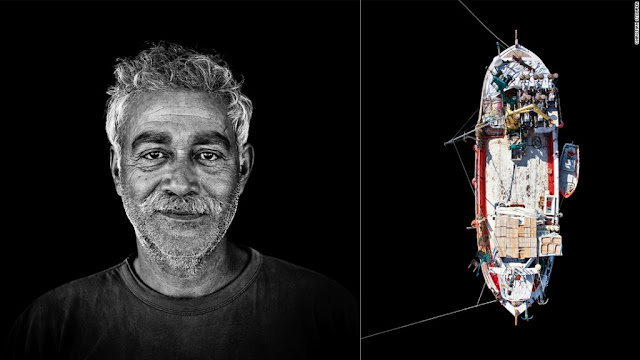CNN - Christian Stemper:''Οι Λύκοι της θάλασσας: Η εξαφάνιση των αλιέων της Πάρου''
Το CNN κάνει ένα αφιέρωμα στους αλιείς της Πάρου. Το άρθρο έχει τίτλο «Οι Λύκοι της θάλασσας: Η εξαφάνιση των αλιέων της Πάρου». Μπορεί να μην είναι το πιο φιλικό ψευδώνυμο, όπως σημειώνεται στο άρθρο, αλλά οι αλιείς που παλεύουν καθημερινά με τις καιρικές συνθήκες στα καταγάλανα νερά γύρω από το ελληνικό νησί της Πάρου είναι απίθανο να παρεξηγηθούν. Το ''LUPIMARIS'' είναι ένα φωτογραφικό ντοκιμαντέρ, το οποίο είναι αφιερωμένο στην ιστορία, τις προσωπικές ιστορίες και τα πρόσωπα των Ελλήνων ψαράδων με τις παραδοσιακές πολύχρωμες ξύλινες βάρκες τους. Από το 2010, ο φωτογράφος Christian Stemper καταγράφει με την φωτογραφική του μηχανή τους τελευταίους ψαράδες που έχουν απομείνει και τις βάρκες τους στην Πάρο. Αυτές οι εικόνες είναι η βάση για ένα βιβλίο που καταγράφει τον τρόπο ζωής, την παράδοση, τις περιπέτειες και το απειλούμενο μέλλον αυτών των τελευταίων Λύκων της Θάλασσας. «Είναι ένα ιδιαίτερο είδος του ανθρώπου» αναφέρει ο Αυστριακός φωτογράφος, ο οποίος έχει περάσει πέντε χρόνια καταγράφοντας τη ζωή τους. «Γι” αυτούς υπάρχει μόνο το σκάφος, η θάλασσα και τα ψάρια. Τίποτα άλλο.»
Wolves of the sea': The vanishing fishermen of Greece's Paros island
"Wolves of the sea" isn't the friendliest of nicknames, but the weather-beaten fishermen who ply the blue waters around the Greek island of Paros are unlikely to care.
"They're a special kind of human," said Austrian photographer Christian Stemper, who has spent five years documenting their lives. "For them, it's just the boat and the sea and the fish."Nothing else."
Photographer Christian Stemper
Stemper began taking photos of the Paros "wolves" in 2010 after several years of vacation visits to the Aegean island.
At first he focused on their caiques, traditional wooden boats that are barely big enough to hold a single fisherman and his catch, let alone their nets.
He was later able -- with some difficulty -- to persuade the boat owners to pose for portraits.
"You need to get to know every harbor," he said. "Each one has its own family -- not quite a mafia -- but you need to meet the boss. And if he tells them to have their photo taken, they go."You can't just turn up as a tourist and start taking pictures."
The result is an affecting set of images that document a way of life that is dying as young people on the island leave home and restaurants turn to cheaper fish imports.
Stemper has paired monochrome images of the fishermen -- their impressively rugged faces contrasting starkly with a black background -- with color images of their boats as viewed from overhead, floating on an inky sea.
Among them is Yannis Perantinos, in his 70s, with a face as craggy as the coastline his boat usually sails along.
There's also Vaggelis Parousis who, in his 60s, is quoted by Stemper as he explains his relationship with the Mediterranean.
"If I do not see any sea, I do not live," he said. "If I had to stay in Athens I would not even survive a whole 24 hours. I would go crazy."
Such is their obsession with the water, Stemper says, that they've been largely indifferent to his project despite their participation.
"After I took pictures in 2012, I held an exhibition in Paros," he said. "I invited them all and told them I would give each one an extra print I'd made for them.
"But actually only one came. The families came -- the wives and the brothers. The rest of them, they don't care."For them, the life is the sea and the boat."
Stemper, who normally works as an advertising photographer, initially began taking his aerial boat shots using a small camera attached to a telescopic arm.
Subsequently, he found a truck with a 25-meter crane that's normally used to haul boats out of the water for winter repairs.
Earlier images were shot with a Canon 5D Mark II, later ones with a Pentax 645 medium-format camera.
In addition to recently completing a film documentary on the "wolves," Stemper is now looking at other traditional ways of life, such as agriculture, that are under threat on the island.
For all the sense of loss that surrounds the decline of fishing on Paros, he says the fishermen still have an enviable view of the world.
"For us it sounds like they have no money, nothing, but they are happy," he said. "They are happy because they have their boats and they have the sea."
Christian Stemper is an Austrian photographer. You can follow him on facebook and learn more about his project here.
By Barry Neild, CNN
June 3, 2015
ΠΗΓΗ
http://edition.cnn.com/2015/06/02/travel/cnnphotos-greek-paros-fishermen-boats/index.html
By Barry Neild, CNN
June 3, 2015
ΠΗΓΗ
http://edition.cnn.com/2015/06/02/travel/cnnphotos-greek-paros-fishermen-boats/index.html










